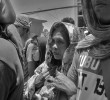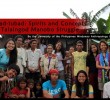The effect of the electoral sabotage is to cast doubt on the electoral process and the integrity of the Comelec itself. The effect of the sabotage strategy against the PPLs was not to undermine the bloc�s political base but to add another cause for making the current presidency illegitimate.
By the Policy Study, Publication and Advocacy (PSPA)
Center for People Empowerment in Governance (CenPEG)
MANILA – Incidents of cheating and manipulation of election results in the May 14 polls were so widespread that almost every voter can attest that the political exercise was indeed fraudulent. Nobody, except possibly administration drumbeaters, would bite the early declarations by Benjamin Abalos, Sr., chairman of the Commission on Elections (Comelec), calling the mid-term elections �fair and honest.�
Emerging from the rough and acrimonious election politics is what now appears as a �special project� of the Arroyo administration, through the machineries of the Armed Forces of the Philippines (AFP), Philippine National Police (PNP), and local election officials to marginalize the bloc of progressive Party-lists (PPLs) in a bid to deny them seats in the House of Representatives.
The PPLs, led by Bayan Muna (BM or people first), which topped the Party-list polls in 2001 and 2004, along with Anakpawis (AP or toiling masses), Gabriela Women�s Party (GWP), Suara Bangsamoro and Kabataan Party, were looking at garnering some 10 to 13 seats in the 2007 elections. The government made sure such projection would be foiled, however.
Partial field reports received from the Task Force Poll Watch (TFPW) 2007 show a systematic operation to undercut the PPLs� capability of winning votes by the use of fraud, particularly in vote-rich towns, and military-police intimidation, particularly in the rural areas where, for instance, AP and Suara were expecting significant votes cast in their favor. (TFPW is an election monitoring and quick reaction body formed before the elections by the PPLs and the Genuine Opposition.)
The Arroyo government through its operators used a three-pronged approach against the PPLs: political manipulation, psychological warfare and armed power. Here�s why:
Accounts showing trends and patterns characterizing this systematic campaign have been received from several towns in 60 of the country�s 80 provinces, with the number of incidents reaching nearly 600 based on partial reports. Poll watchers and Party-list activists could smell every mud and stench thrown in nearly all corners of the country � even in the presence of foreign observers – to make sure none of the PPLs would win. In the next few days, more reports are expected from these areas as well as from the rest of the provinces that would unfold the depth and magnitude of the government project against the PPLs.
Deliberate, blatant and illegal
For now, it is sufficient to conclude that to implement this special project, armed troops, policemen as well as election officials were used. Many cases showing fraud and intimidation directed against the PPLs, voters and their watchers were deliberate, blatant, and obviously illegal. If Abalos is asking for �smoking gun� to show election fraud and violence, these reports would amount to tons of evidence that would take him possibly the rest of his life to examine.
In Pampanga, Mountain Province, Kalinga, Batangas, Cavite, Albay, Camarines Sur and Norte, Cebu, Samar, Negros Occidental, Biliran, Sultan Kudarat, Misamis Oriental, Shariff Kabunsuan, and many other provinces votes for BM, Suara Bangsamoro and other PPLs were shaved – in many cases to 0 votes. In Upi, Shariff Kabunsuan, for example, the votes of Suara were deleted �at gunpoint,� poll watchers reported.
Cases of vote padding particularly in favor of government-formed and �supported Party-lists were reported in Isabela, Bohol, Zamboanga Sibugay, Zamboanga del Sur, Sultan Kudarat, Surigao del Norte, Basilan, Sulu, and other provinces. In Isabela, northern Luzon, and Zamboanga del Sur in southern Philippines, tens of thousands of votes were reportedly added to ANC, APEC, Kasangga, ALIF, Ahonbayan, Coop-Natco, and Uni-Mad.
On May 29, the PPLs filed charges of �electoral sabotage� with the Comelec office against the provincial canvassers of Zamboanga Sibugay for allegedly padding the votes of government-backed Uni-Mad and Coop-Natco. Instead of the 1,723 votes in the certificates of canvassing (COCs), the provincial canvassers gave Coop-Natco 10,447 votes in the statements of voting (SOVs), while Uni-Mad was given 16,194 votes in the SOVs as against only 281 in the COCs, lawyer Neri Colmenares said.
Vote padding fallaciously increased the number of votes �counted� compared to the actual votes cast, thus increasing the 2 percent threshold that a Party-list should muster to gain one seat and this victimized, in particular, small Party-list groups such as Kabataan and Suara. This manipulation increased the chances of at least 3 to 5 Party-lists out of the more than 22 formed and supported by the administration to garner seats in the House at the expense of the genuine Party-lists.
Intimidation
In terms of huge clusters of votes projected to have been lost by the PPLs, attribute that to military and police intimidation during and after the May 14 elections. In Nueva Ecija, Tarlac, Pampanga, Bataan, Laguna, Cavite, the Bicol provinces, Samar, Bohol, Negros Occidental, Compostela Valley, Misamis Occidental and other provinces known to be bailiwicks of the PPLs, masses of voters were disenfranchised as a result of alleged military and police intimidation and psywar tactics Voters including barangay officials were warned not to vote for the PPLs otherwise the military would �get back at them,� poll watchers reported. Threats and intimidation prevented thousands of voters from going to the polling precincts.
During the election, moreover, many PPL poll watchers were barred by police, armed goons and, in many cases, by election officials from entering the canvassing areas. Two young poll watchers of Kabataan were abducted on May 15 in Capalonga, Camarines Norte. Their bodies were found two days later. In other separate incidents, three more coordinators of Anakpawis and BM also went missing in Cagayan Valley and Palawan.
Years in the making
Human rights groups and poll watchers in these provinces say that the government sabotage of the PPLs� electoral machine has been years in the making. Its latest phase began right after the 2004 elections which was topped by BM, with AP and GWP gaining seats. Apparently, the military was able to secure tactical information on the electoral base of the progressive bloc � possibly from Comelec sources � giving them ideas where armed troops can be fielded to intimidate voters.
Equipped with this electoral intelligence, the campaign of sabotage was placed under government�s Operation Bantay Laya (OBL) leading to the militarization of the suspected electoral bailiwicks, smear campaigns and harassments against the PPLs, their organizers and suspected supporters. Human rights reports say that the extra-judicial executions of hundreds of PPL activists and the abduction of scores of others � now the subject of international scrutiny – were part of this security strategy.
In the recent elections, it is widely believed that the government sabotage of the PPL machinery also included the deployment of about 200 soldiers in 23 barangays of the National Capital Region (NCR) to conduct anti-PPL propaganda; the fielding of at least 22 fake Party-lists and their accreditation by Comelec; meetings allegedly organized by top police officials lecturing local Comelec officials about the PPLs� threat; and so on.
It is too early to estimate in numbers the costs that the progressive Party-list bloc had to pay in participating in the recent elections. One thing is clear, however: Nothing seems to stop masses of people from supporting the PPLs� political platform. Intimidation has not deterred hundreds of thousands of other voters from casting their votes for the �politics of change.�
The effect of all these � as well as the fraud and violence inflicted on the GO and other candidates � is to cast doubt on the electoral process and the integrity of the Comelec itself. The effect of the sabotage strategy against the PPLs was not to undermine the bloc�s political base but to add another cause for making the current presidency illegitimate, as others would see it. (CenPEG)
2007 Elections, Analysis
![[STANDPOINT] Illegal drugs and the NIMBY mindset](https://davaotoday.com/wp-content/uploads/2016/09/Mags-Maglana_UPMIN-Sept.-20-110x100.jpg)








